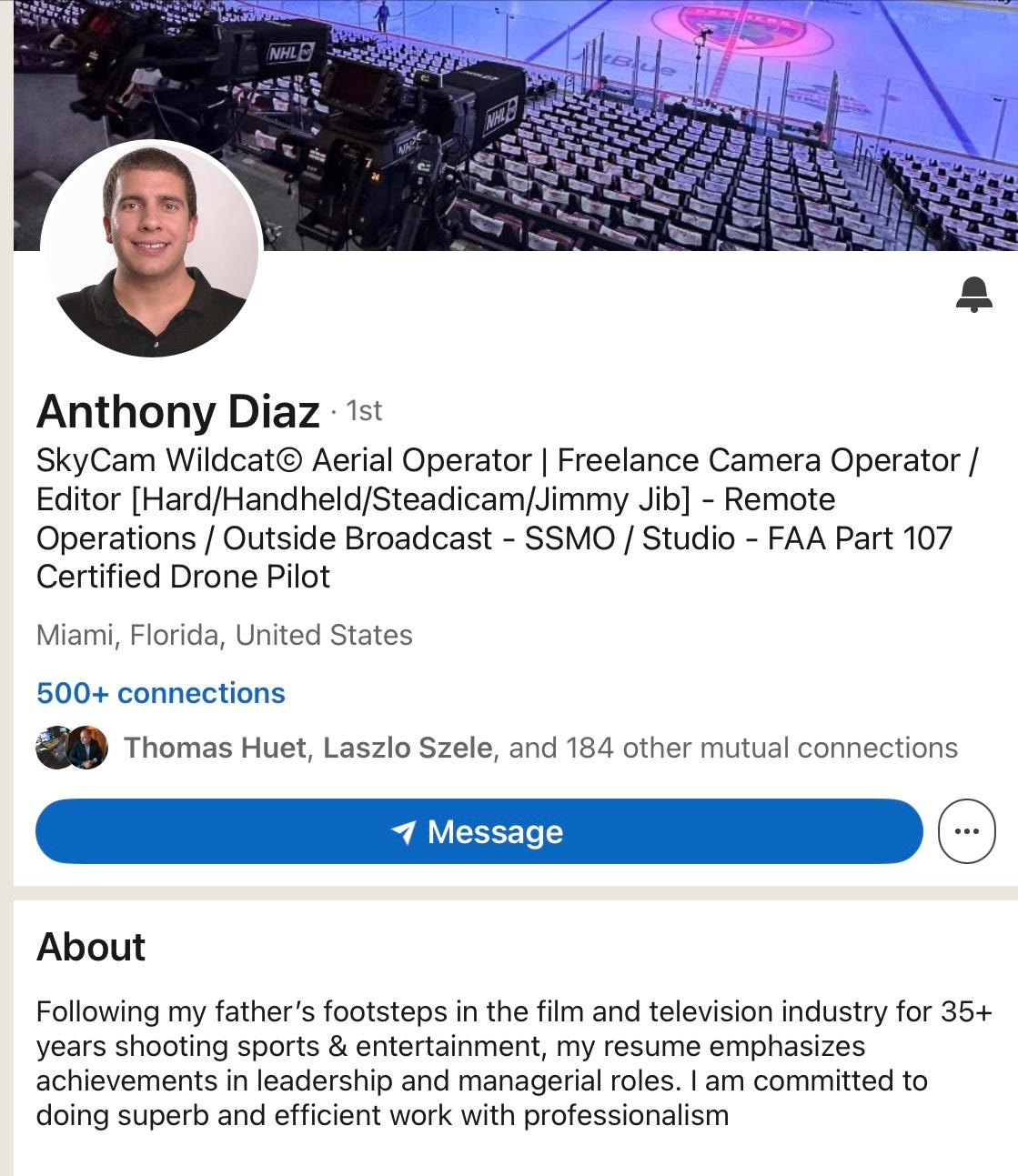Multi-skilled, never unemployed.
One-trick ponies fade away, while Swiss Army broadcasters thrive.
Inside Today’s Issue:
Why being a multi-skilled broadcaster can keep your agenda full.
How camera operators, engineers, producers, and commentators can adapt to the shift.
Practical tips to future-proof your broadcasting career.
Meet Anthony Diaz, one of the most multi-talented professionals I know.
One quick glance at his LinkedIn profile will show you: Anthony Diaz is the ultimate ‘Swiss Army Knife’ broadcaster.”
Pros like Anthony aren’t just versatile—they’re future-proof. And their career success boils down to one simple equation:
Multiple skills + excellent work ethics = successful broadcasting career
Specialist vs. Generalist: The Big Shift in Broadcasting
The broadcasting industry is quietly undergoing a significant shift.
For decades, we thrived by becoming specialists. You were:
A camera operator mastering 1-2 positions.
An engineer focusing only on satellite uplinking.
A commentator for one single sport.
But the game has changed.
Now, broadcasters who can only do one thing well are increasingly at risk.
Why Multiple Skills Matter Now
Here's the reality:
Budgets are shrinking.
Technology advances faster than ever.
Remote productions mean we must operate independently and under different scenarios.
The result?
Production teams now want people who can handle tasks beyond their core expertise:
Camera operators who can fill multiple positions.
Engineers who understand both satellite and streaming.
Producers who can edit basic video or run graphics
Commentators who can research their own stats and support social media.
Simply put, Swiss Army Knife broadcasters have more chances to always have a job.
How to Become Indispensable
Here's a practical approach for different roles:
📹 For Camera Operators:
Your core skill is visual storytelling. Add these:
Learn different production technologies (bonded cellular, remote shading, etc.)
Become good at operating different equipment like cranes, pole cam systems, or gymbal cameras.
Become comfortable with emerging technology like AI-assisted cameras, so you’re the one who helps integrate and operate new gear.
🔧 For Engineers:
Your core skill is reliability. Broaden with:
Expand your knowledge into IP workflows and cloud-based production.
Learn about basic graphics software and streaming tools (like vMix, OBS, or Wirecast), so you can troubleshoot beyond traditional engineering tasks.
Understand enough about camera operation and transmission to support remote crews efficiently.
🎬 For Producers and Directors:
Your core skill is storytelling and execution, but you’re even stronger when you can do more:
Become proficient in automation so you can create scripts and run of shows quicker.
Learn to operate software based video switchers or other tools for emergencies and small productions.
Understand enough technical detail about transmission and remote operations to communicate clearly with engineers and operators.
🎙️ For Commentators:
Your core skill is live storytelling. Add:
On-camera presence for pre/post-match coverage
Self-sufficient research and stats preparation.
Quick digital content creation skills.
How to Add Skills Without Breaking Your Schedule
You don't need formal training to start:
Shadow colleagues in other positions.
Volunteer for tasks slightly outside your comfort zone.
Ask for cross-training during downtime.
The Career Protection Plan
When budgets shrink, specialists go first.
But Swiss Army Knife broadcasters?
They're never the first cut.
They become the first chosen—and increasingly valuable.
A broadcaster who can handle multiple tasks on site, in the truck, or remotely is a production's secret weapon.
Your New Mindset
In broadcasting today, the question isn't "Should I specialize?" but "What skills can I add to become indispensable?"
People like Anthony Diaz who always have a full calendar aren't just adaptable—they're essential and future-proofed.
So next time someone asks, "What's your specialty?", you can reply:
"I can wear many hats and they all look good on me."
What’s Your Take?
Have you already started adding new skills to your toolkit? Reply and tell me what new skills you’re picking up—I might feature your story in a future issue.



